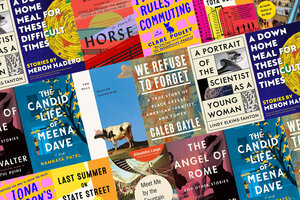Kick off summer with the 10 best books of June

Discover your next favorite book, whether you’re in the mood for insightful short stories about the immigrant experience, a startling fantasy novel about survival, or a deep exploration of a little-known aspect of Native American history.
1. Horse by Geraldine Brooks
“Horse” is not just about a racehorse but about race. This heart-pounding novel about a famous antebellum champion thoroughbred named Lexington and his talented, enslaved trainer circles two tracks, one historical, one contemporary, to highlight the ongoing scourge of racism in America.
Why We Wrote This
Our 10 picks for June include books about a Black horse trainer’s dignity in the face of racism, a train car full of commuters who learn to lean on each other, and a timely reimagining of America’s neglected shopping malls.
2. A Down Home Meal for These Difficult Times by Meron Hadero
Displacement haunts Meron Hadero’s superb debut short story collection. Hadero gorgeously illuminates quotidian moments to create unforgettable characters: a refugee learning English, a preteen confronting racism, and two friends whose lives can be tracked through the pages of “The Good Housekeeping Illustrated Cookbook.”
3. Last Summer on State Street by Toya Wolfe
Fe Fe Stevens’ Chicago neighborhood is under attack. As the housing authority tears down the high-rises the sixth grader and her friends call home, other threats edge closer – gang violence, drugs, hostile police. “Know what you want to do, so no one else ends up deciding,” urges a neighbor. Resilient and open-hearted, Fe Fe finds her way in Toya Wolfe’s moving debut.
4. Iona Iverson’s Rules for Commuting by Clare Pooley
“Never talk to strangers on the train.” It’s one of Iona Iverson’s “rules for commuting” – advice she promptly ignores in Clare Pooley’s buoyant novel. Flamboyant former “It Girl” Iona, overlooked and belittled at her London-based magazine job, gets drawn into an incident on the 8:05 to Waterloo. As the commuters begin to interact, community forms and stereotypes slide away.
5. The Wall by Marlen Haushofer
First published in 1962, “The Wall” offers a gripping survival story well tuned to today. A 40-something woman visiting a hunting lodge in the forest discovers she’s cut off from the world by an invisible, impenetrable wall. As she scrambles to secure food and fuel, her only companions – a dog, a cow, and a cat – teach and sustain her in this remarkable tale of perseverance.
6. The Candid Life of Meena Dave by Namrata Patel
When Meena, a photographer, inherits an apartment in Boston, her solitary life is upended. Cryptic notes, friendly Indian “aunties,” and a handsome neighbor all inspire her to search for answers to secrets from her past. This charming story wraps history and culture in a message of lives renewed.
7. The Angel of Rome by Jess Walter
Reading Jess Walter’s second collection of short stories, one is shepherded through sometimes gritty terrain, but with the constant assurance of finding light and unexpected laughs. He mines gold from the profound perspectives of his unique characters.
8. A Portrait of the Scientist as a Young Woman by Lindy Elkins-Tanton
Lindy Elkins-Tanton, a planetary scientist, tells how she overcame obstacles to lead the NASA mission that will send a rocket to explore the massive asteroid Psyche. Her beautiful and inspiring memoir illuminates the challenges faced by women in science.
9. Meet Me by the Fountain by Alexandra Lange
Architecture critic Alexandra Lange’s fascinating cultural history explores the shopping mall, beginning with its birth in postwar America. She captures the mall’s role in providing freedom to some while excluding others, and offers ideas for how to re-imagine the empty shopping centers that now dot the suburban landscape.
10. We Refuse To Forget by Caleb Gayle
Caleb Gayle’s eye-opening account centers on Black members of the Creek tribe, who were long considered fully Creek but whose tribal membership was revoked in 1979. In tracing their history up to current legal efforts by descendants to be reinstated in the tribe, Gayle complicates our easy assumptions about American identity.

